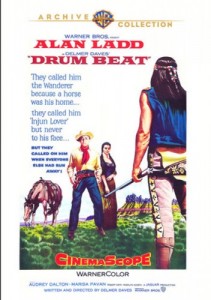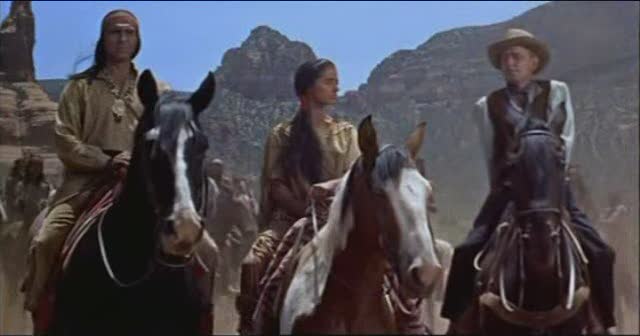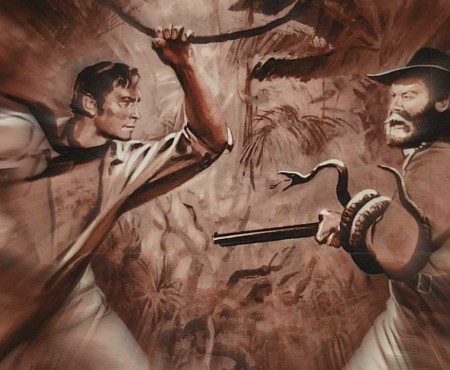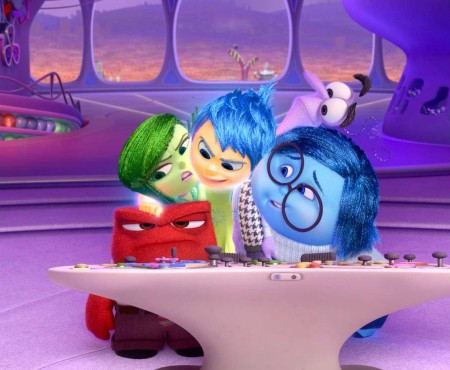Distributor: Warner Archive
Release Date: July 15, 2014
MSRP: $21.99
Order at Warner Archive (discs made to order)
Film: B- / Video: C- / Audio: C / Extras: n/a
Alan Ladd’s Johnny McKay arrives at the White House at the start of Drum Beat on the invitation of President Grant to discuss tensions on the California/Oregon border with the Modoc tribe. Dressed in a dusty jacket and earthen tones, Johnny looks completely out of place next to royal blue Union uniforms and alabaster halls, and only more so when he is called into a private, red-painted parlor to meet with the president, an advisor, and several women who ask him fascinated, improper questions about life around Indians, particularly curious about miscegenation. For all the interracial differences that hang over the question of the settlement where Johnny lives, this early scene also exposes intraracial confusion among members of the same race with unfathomable experiences.
Johnny’s sense of displacement is only compounded when Grant, having listened to Johnny tell stories about being a noted Indian fighter thanks to seeing his family murdered, presses him into service as a peacemaker, charged with brokering an agreement between the settlers and Modoc. In contrast to certain honorable go-betweens who occasionally dot Westerns (think John Wayne’s roles in Ford’s Cavalry trilogy), Johnny isn’t given to peacefulness by nature. Ladd plays up the discomfort the man feels in his new role: around 40 at the time of filming, Ladd could physically pass for several years younger, yet he looks tired and stretched-thin from a lifetime of frontier living and the added pressures of defusing this powder keg. Whether other heroes nobly despair at an unwinnable situation, Johnny himself looks as if he’s trying hard not to be the one to push it into war.
Lord knows he has his work cut out for him, as no sooner does a stagecoach carrying Johnny and several other passengers stop for a brief view of a river vista than a Modoc warrior puts an arrow through the heart of the stage driver’s companion setting off a film’s worth of incessant revenge killings on both sides that escalate into open war. The action of the film is pitched at a large scale, not as spectacle, but as a means of illustrating the speed and fervor at which violence escalates. Extreme long shots of cliffs reveal a complicated latticework of ladders for Modoc fighters to take an enemy by surprise, and cavalry charges are similarly rendered in epic sweeps. Even the smaller moments of violence that instigate these swarming reprisals are given breadth, as in the scene where a parley between Johnny’s party and the renegade Modoc leader Captain Jack (Charles Bronson) breaks down and the camera pulls back along with the Modoc who suddenly step back from the sitting whites, making clear the double-cross about to happen.
Delmer Daves’ Native-American-themed westerns are, if not unprecedented, certainly rarities in a genre with a rich history of colonial racism. {Drum Beat}, like his best work, depicts a complex web of peace-seekers and agitators on both sides, and an understanding of tribal grievances that nonetheless mourns the back-and-forth carnage that erupts from displacement, occupation, and unclear borders. (The film is uncomfortably timely given the recent Israel-Gaza conflict, though its cavalry and Modoc warriors are more evenly matched.) Some distracting subplots—including, naturally, Johnny’s love life—and overbearing recapitulations of theme make the film more of a drag than, say, Broken Arrow, but this is still an impressive entry from one of the genre’s pre-revisionist liberals.
A/V
 The first thing one sees in Warner Archive’s transfer of the film are scratches that precede the first titles, and the image hardly improves from there. Soft details, faded colors, weak contrast and consistent print damage abound, and for a time this stood out as the worst-looking Warner Archive disc I’ve yet seen. Eventually, the image somewhat evens out, or perhaps I just got used to the disappointment,
The first thing one sees in Warner Archive’s transfer of the film are scratches that precede the first titles, and the image hardly improves from there. Soft details, faded colors, weak contrast and consistent print damage abound, and for a time this stood out as the worst-looking Warner Archive disc I’ve yet seen. Eventually, the image somewhat evens out, or perhaps I just got used to the disappointment,
make for one of the weaker transfers I’ve seen from Warner Archive, whose generally hands-off approach nonetheless tends to produce better-looking work than this. Audio is not as bad, but it suffers from an occasional lack of clarity and a generally quiet pitch. You’ll have to crank up your system to hear it, and pray you remember to turn it back down again before you go back to something with better sound and wake up half the neighborhood.
Extras
No extras are included on Warner’s disc.
Overall
Delmer Daves’ solid B-picture gets a modest, sometimes frustrating disc from Warner Archive.




















